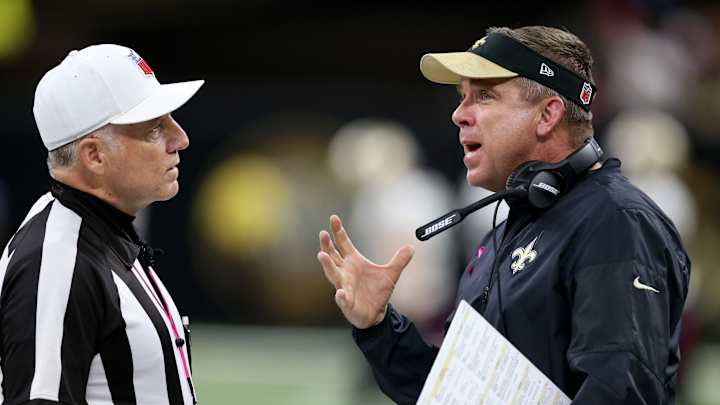Why the first 4 Saints games will have the most replay camera angles

NEW ORLEANS — There shouldn’t be any missed replay angles for the New Orleans Saints through the first four weeks of the season.
With four games on four different networks, the Saints will likely have their games announced by the four No. 1 network broadcast crews on ESPN, Fox, CBS and NBC. With those announcers should be anywhere between 25 and 40 camera angles from which officials can review plays, ESPN officiating analyst John Parry said in a telephone interview.
For the regional games in the noon or 3:05 p.m. Central time slot, Parry said many networks will have as few as 10 cameras from which plays can be reviewed.
The bigger games get more camera coverage.
“This year, with pass interference being (under review), it’s going to have a bigger impact,” said Parry, a 19-year NFL officiating veteran whose final game was the most recent Super Bowl. “Every one of those (camera) angles is huge,” said Parry, who thinks the disparate number of camera review angles at NFL games will become a hot topic around the league.
Monday Night Football producer Jay Rothman said during an ESPN teleconference last week how Patriots coach Bill Belichick already has called for a standardization of replay camera angles, so that officials have league-installed down-the-sideline and goal-line cameras from which to make calls.
This has been a years long conversation topic among coaches. But the ability to challenge interference calls and non-calls creates another twist.
“I can’t speak to the other broadcast partners once you get below their primary game or secondary game,” Rothman said. “But inevitably there’s not as many cameras placed on the field, not as many looks.
“When it comes to pass interference or defensive pass interference, when it’s not a star player who is typically isolated off the ball (by a camera), when you’re talking about the second, third and fourth receivers who were interfered with, chances are those looks that television trucks are able to provide to replay (officials) are very limited.”
Rothman had “some casual conversations” during the offseason with a couple head coaches to explain the difference between the national games and when they’re in a regional window, he said.
“I think that’s another strategy that coaches have to take into consideration,” he said. “Understanding the hardware that each of the broadcast partners bring to them on a weekly basis and having confidence in throwing the (red challenge) flag or not throwing the flag. I think that will very much come into it.
“Obviously in these primetime national games that we have multiple looks, high frame-rate cameras, specialty cameras that they will feel confident. That’s kind of fascinating and interesting to me as it relates to the new rule.”
Certainly, multiple camera angles let viewers see how officials missed the pass interference and helmet-to-helmet penalties by the Rams’ Nickell Robey-Coleman on the Saints’ Tommylee Lewis in the NFC championship.
The Saints begin the season with a 6:10 p.m. Central time Monday kickoff on ESPN against the Houston Texans. Then come a pair of 3:25 p.m. Central starts at the Los Angeles Rams on Fox and the Seattle Seahawks on CBS (a cross-flexed game) and a 7:20 p.m. Central start at home against the Dallas Cowboys.
To Sean Payton, the varying camera angles is "kind of like a box of chocolates," he said Monday.
"Each week is a little different with where you're at," the coach added. "You just hope they get the information clearly, and if you don't, you're relying on your sight and the sight of others on your staff."
Regardless of camera angle, Payton said league replay officials appear to have a conservative approach to overturning pass interference calls or non-calls.
“A stubborn consistency," he said about keeping a high standard for overturning calls.
"They're going to have to see clear and obvious evidence (when overturning a call),” he said.
How much the new rule will impact games could be up for debate. Game officials called defensive pass interference 249 times in 256 regular season games last season, which comes out to less than one per game.
Payton noted how he plans to keep a challenge flag available for late in games. Only in the clearest of circumstances does he plan to throw challenge flag.
“We still only get two,” he said.
As last season showed, what happens late in games can have the biggest impact.
